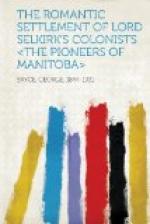We are not disposed to press Milton’s metaphor any further in regard to the disturbers who came in upon Frank Larned’s peaceful scene.
The time for opening up Rupert’s Land was approaching. The agitation of the people themselves, the constant petitions to Great Britain and Canada called for it. The set time had come; 1857 was a red letter year in this advance. In that year the British Parliament appointed a large and powerful committee to investigate all phases of Rupert’s Land, its history; government; geological, climatic, physical, agricultural, social, and religious conditions. The blue book of that year is a marvel of intelligent work. In this same year the British Government sent out the Palliser-Hector Expedition to Rupert’s Land to obtain expert evidence in regard to all these points being considered by the Parliamentary Committee. Also in this year the Canadian Government dispatched the Dawson-Hind Expedition to obtain detailed information as to the physical and soil conditions of the prairie region, and it is said that the report of this party of explorers is one of the most accurate, sane, and useful accounts ever given of this prairie country.
With all this attention being paid to the country and with the press of Canada awakened to see the possibility of extending Canada in this direction, it is not to be wondered at, that adventurous spirits found out this Eden and sought in it for the tree of life, perchance often finding in it the tree of evil as well as that of good.
Of course, to the modern philosopher the disturbances of these peaceful seats is simply the symptom of progress and the struggle that is bound to take place in all development.
But to the Hudson’s Bay Company pessimist, or to the grey-headed sage, the greatest disturbers of this Eden were two Englishmen, Messrs. Buckingham and Coldwell, who, in 1859, entered Red River Colony, and established that organ for good or evil, the newspaper. This first paper was called “The Nor’-Wester.” It is amusing to read the comments upon its entrance made by Hudson’s Bay Company writers, both English and French. The constitution and conduct of the Council of Assiniboia was certainly the weak point in the Hudson’s Bay regime, and the Nor’-Wester kept this point so constantly before the people that it was really a thorn in the side of the Company. The Nor’-Wester, itself, was surely not free from troubles. The Red River Community was very small, so that it could not very well supply a constituency. Comparatively few of the people could read, many felt no need of newspapers, and the Company certainly did not encourage its distribution. It would have been a subject of constant amusement had the Nor’-Wester been in operation in the days of Judge Thom and his policy of repression. Mr. Buckingham did not remain long in Red River Settlement. Mr. Coldwell became the dean of newspaperdom in the Canadian West. The great antagonist of the Hudson’s Bay Company,




